|
|
|
Sort Order |
|
|
|
Items / Page
|
|
|
|
|
|
|
| Srl | Item |
| 1 |
ID:
043100


|
|
|
|
|
| Publication |
London, Macmillan, 1986.
|
| Description |
xiii, 359p.
|
| Series |
Macmillian international political economy seires
|
| Standard Number |
0333371739
|
|
|
|
|
|
|
|
|
|
|
|
Copies: C:1/I:0,R:0,Q:0
Circulation
| Accession# | Call# | Current Location | Status | Policy | Location |
| 027523 | 338.96/RAV 027523 | Main | On Shelf | General | |
|
|
|
|
| 2 |
ID:
046610
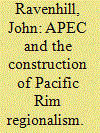

|
|
|
|
|
| Publication |
Cambridge, Cambridge University Press, 2001.
|
| Description |
xii, 294p.
|
| Series |
Cambridge Asia-Pacific studies
|
| Standard Number |
0521667976
|
|
|
|
|
|
|
|
|
|
|
|
Copies: C:1/I:0,R:0,Q:0
Circulation
| Accession# | Call# | Current Location | Status | Policy | Location |
| 045948 | 337.15/RAV 045948 | Main | On Shelf | General | |
|
|
|
|
| 3 |
ID:
049846
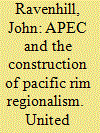

|
|
|
|
|
| Publication |
United Kingdom, Cambridge University Press, 2001.
|
| Description |
xii, 294p.
|
| Standard Number |
0521667976
|
|
|
|
|
|
|
|
|
|
|
|
Copies: C:1/I:0,R:0,Q:0
Circulation
| Accession# | Call# | Current Location | Status | Policy | Location |
| 045455 | 337.15/RAV 045455 | Main | On Shelf | General | |
|
|
|
|
| 4 |
ID:
111027
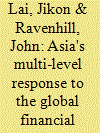

|
|
|
| 5 |
ID:
140720


|
|
|
|
|
| Summary/Abstract |
Economists have warned for many years that preferential trade agreements (PTAs) will not necessarily increase economic welfare in Australia given the relatively small size of the economy and the country’s lack of negotiating coin. The Productivity Commission cautioned in its major report on PTAs that there seemed to be a mindset of ‘agreements for agreement’s sake’, in part because of fears of missing out on a bandwagon that has attracted Australia’s major trading partners. Political and security considerations have played an important role in shaping Australia’s approach to PTAs. When politics trumps economics in negotiations of PTAs there is a risk of a rush to premature agreement that produces sub-optimal outcomes, that undermines broader plurilateral and global negotiations, and that introduces new and undesirable distortions in trade and public policies. Various theoretical approaches to trade policymaking provide insights into why Australian governments have been willing to conclude these sub-optimal deals.
|
|
|
|
|
|
|
|
|
|
|
|
|
|
|
|
| 6 |
ID:
085957
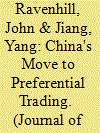

|
|
|
|
|
| Publication |
2009.
|
| Summary/Abstract |
China was a latecomer to the preferential trading bandwagon that has swept East Asia in the years since the financial crises. The Chinese government was unwilling to go down the path of negotiating bilateral and minilateral agreements until the terms of its accession to the World Trade Organization were finalized. Since then, it has become one of the most active participants in the negotiation of preferential trading arrangements, currently being engaged in negotiations with more than 20 countries. The paper will address the following questions about China's move to preferential trade: (a) What forces are driving China's approach to the negotiation of preferential trade agreements? (b) To what extent is it possible to untangle economic and political motivations in China's choice of partners for PTA negotiations? And, which economic interests are being pursued most aggressively? (c) How are conflicting domestic interests reconciled in the policy-making process? (d) To what extent will the new PTAs facilitate Chinese-dominated production networks in the regions? (e) What overall impact will the PTAs have on the Chinese economy?
|
|
|
|
|
|
|
|
|
|
|
|
|
|
|
|
| 7 |
ID:
087941
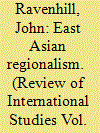

|
|
|
|
|
| Publication |
2009.
|
| Summary/Abstract |
East Asia has emerged over the last decade as the most active site for the negotiation of regional inter-governmental collaboration. The primary focus has been on trade but, in the wake of the financial crises, governments have also engaged in historically unprecedented collaboration in several areas of finance. Multiple factors have driven this new regional engagement. Although the agreements have been primarily economic in their focus, the primary motivation for many of them has been to secure diplomatic or strategic gains. The aggregate benefits from the agreements are likely to be limited given the low levels of tariffs and the availability of provisions that facilitate the intra-regional exchange of components. They may, however, be of significant interest to producers of specific products either because they provide advantage over competitors (or remove the advantage that competitors through agreements that their governments have signed). The trade agreements thus often reflect particularistic interests that governments have been enlisted to champion.
|
|
|
|
|
|
|
|
|
|
|
|
|
|
|
|
| 8 |
ID:
120202
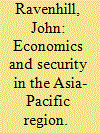

|
|
|
|
|
| Publication |
2013.
|
| Summary/Abstract |
The relationship between economics and security remains relatively unexplored, particularly in the Asia-Pacific context. The articles in this special section of the journal seek to broaden our comprehension of various dimensions of this relationship. One focus is to understand the circumstances in which issues have come to be defined as components of national 'security'. A second is to develop a more nuanced approach to conflict, one that recognizes that interstate conflict can take numerous forms short of the outbreak of military confrontation. Our starting point is to emphasize that 'security' is a social construction: issues become 'securitized' when political actors identify them as posing a threat to national security. The redefinition of national understandings of security by state elites is one instance of how economics and security can become intertwined. Economic competition, however, can generate a second dimension to the economics-security nexus, which occurs when it spills over into the traditional security domain, that is, into military rivalries between states. Our studies provide some grounds for optimism on the relationship between economics and security - albeit one that has to be tempered both by the failure of countries in the region to develop deeply institutionalized means for dispute resolution and by the evidence that economic issues can be a significant source of both interstate and intrastate conflict.
|
|
|
|
|
|
|
|
|
|
|
|
|
|
|
|
| 9 |
ID:
163124
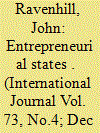

|
|
|
|
|
| Summary/Abstract |
The emergence of newly prominent participants (NPPs) in global governance has led to a revival of scholarly interest in the concept of middle powers. Because NPPs do not share the characteristics of “classical” middle powers, analysts have attempted to salvage the concept by adding various qualifiers. In doing so, they have further reduced its analytical utility. The concept of “entrepreneurial” states extracts the valuable components of the literature on middle powers while avoiding the problems arising from the conflation of two elements of behaviour—strategic and purposive. Entrepreneurial states are countries that seek to gain the support of others in pursuit of their perceived interests in the international system. They may be supporters of the current system, or seek to change it fundamentally. We investigate what attributes are necessary for states to behave in an entrepreneurial manner through studies of both successful and failed attempts at policy entrepreneurship.
|
|
|
|
|
|
|
|
|
|
|
|
|
|
|
|
| 10 |
ID:
083490


|
|
|
|
|
| Publication |
2008.
|
| Summary/Abstract |
Contrary to expectations at the time, the financial crises of 1997-98 may have strengthened ASEAN. The backlash against a perceived unsympathetic Western response put ASEAN at center stage in new regional cooperative arrangements. Moreover, the rivalry between China and Japan for regional leadership has led them both to seek to negotiate regional partnerships with ASEAN as a whole. ASEAN, however, faces new challenges - particularly from rapid economic growth in China and India, and from the proliferation of preferential trade agreements (PTAs). ASEAN has made only slow progress in economic cooperation, which has fallen further behind schedule. The private sector makes little use of ASEAN's preferential arrangements because they afford little advantage over most-favored-nation tariffs. ASEAN has failed to address 'deeper integration' issues - the removal of 'beyond border' barriers to trade. Some of the bilateral PTAs that ASEAN countries have negotiated with extra-regional partners go further in removing barriers than ASEAN's own arrangements. ASEAN members continue to eschew binding commitments. Liberalization under ASEAN's auspices has not been sufficiently significant to encourage business groups to invest substantial resources in lobbying for deeper integration
|
|
|
|
|
|
|
|
|
|
|
|
|
|
|
|
| 11 |
ID:
104828
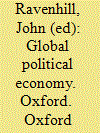

|
|
|
|
|
| Publication |
Oxford, Oxford University Press, 2011.
|
| Description |
xxvii,
|
| Standard Number |
9780199570812
|
|
|
|
|
|
|
|
|
|
|
|
Copies: C:1/I:0,R:0,Q:0
Circulation
| Accession# | Call# | Current Location | Status | Policy | Location |
| 056074 | 337/RAV 056074 | Main | On Shelf | General | |
|
|
|
|
| 12 |
ID:
082364
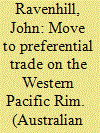

|
|
|
|
|
| Publication |
2008.
|
| Summary/Abstract |
Since* the turn of the century the Asia-Pacific region has become the most active location for the negotiation of preferential trade agreements (PTAs)-a dramatic change from the period before the financial crises of 1997-98. Substantial variance in scope exists among the more than 80 PTAs currently being implemented, negotiated or which are under study in the region. Those involving the United States are by far the most comprehensive. At the other end of the spectrum are those involving ASEAN and China, which are largely 'aspirational' in their provisions. This variance points to the range of economic and political objectives that PTAs serve. Regardless of the comprehensiveness of their coverage, the overall economic effects of the new PTAs is likely to be small given the prevailing low level of tariffs, the intervention of other factors such as fluctuating exchange rates, the proliferation of agreements (which removes the advantages they accord individual partners), and the unwillingness of governments to liberalise 'sensitive' sectors. Few of the agreements move substantially beyond existing WTO provisions. The proliferation of PTAs not only has tended to shift attention and resources away from negotiations at the global level but also runs the risk of fragmenting the 'pro-liberalisation' coalition in countries that have signed multiple agreements.
|
|
|
|
|
|
|
|
|
|
|
|
|
|
|
|
| 13 |
ID:
108706


|
|
|
|
|
| Publication |
2011.
|
| Summary/Abstract |
The Asia-Pacific region is home to a large and rapidly growing number of preferential trade agreements (PTAs). These agreements differ widely in design, scope and purpose. The "noodle bowl" that has resulted runs the risk of distorting investment and trade. Neither global institutions (the WTO) nor regional institutions such as the Asia Pacific Economic Cooperation (APEC) grouping have successfully addressed these issues. Amidst this increasingly messy situation, the proposed Trans-Pacific Partnership (TPP) agreement stands out for a range of important economic and political reasons, not least of which is its potential to take existing PTAs in the Asia-Pacific region in a new direction. The aim of the TPP negotiators is to produce a comprehensive, high quality, multi-party agreement to tame the tangle of PTAs and be a potential stepping stone to achieving the goal of liberalizing regional trade on a non-discriminatory basis. The economic gains from removing border barriers among the countries involved in the initial TPP negotiations are likely to be limited, however, given the small size of many of the economies and the existing PTAs among them. To date, the US has been unwilling to offer a single set of arrangements for all TPP partners, preferring to build on existing bilateral agreements. Pessimism about the immediate results from the TPP should be tempered, however, by considerations of the dynamics that it might set in train; on the other hand, it has the potential to divide the region and exacerbate China's concerns about "containment".
|
|
|
|
|
|
|
|
|
|
|
|
|
|
|
|
| 14 |
ID:
149057
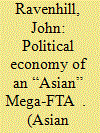

|
|
|
|
|
| Summary/Abstract |
Like other proposed mega-FTAs, the Regional Comprehensive Economic Partnership (RCEP) is intended to address twenty-first-century trade issues. The attributes of the RCEP negotiations are unique, however—being shaped by the dominant political interests in its member states and by the particular character of economic interdependence in the region.
|
|
|
|
|
|
|
|
|
|
|
|
|
|
|
|
| 15 |
ID:
039521


|
|
|
|
|
| Publication |
London, Macmillan, 1988.
|
| Description |
ix, 457p.
|
| Standard Number |
0333468384
|
|
|
|
|
|
|
|
|
|
|
|
Copies: C:1/I:0,R:0,Q:0
Circulation
| Accession# | Call# | Current Location | Status | Policy | Location |
| 030432 | 320.96/CHA 030432 | Main | On Shelf | General | |
|
|
|
|
| 16 |
ID:
006356


|
|
|
|
|
| Edition |
2nd ed
|
| Publication |
Boulder, Lynne Rienner Publishers, 1992.
|
| Description |
xi, 483p.
|
| Standard Number |
1555872832
|
|
|
|
|
|
|
|
|
|
|
|
Copies: C:1/I:0,R:0,Q:0
Circulation
| Accession# | Call# | Current Location | Status | Policy | Location |
| 038059 | 320.96/CHA 038059 | Main | On Shelf | General | |
|
|
|
|
| 17 |
ID:
082363


|
|
|
| 18 |
ID:
120204
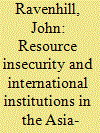

|
|
|
|
|
| Publication |
2013.
|
| Summary/Abstract |
East Asian governments have long recognized that national security must incorporate a reduction of their vulnerability to the disruption of essential imports. The rapid economic growth of China and India has intensified competition for increasingly scarce resources, elevating resource security once again to the top of the international agenda. Issues that were previously regarded as 'technical' have been 'securitized' as state elites perceived possible conflicts over availability and pricing of natural resources as threats to national security.
International institutions have the potential to contribute to the defusing of tensions over the supply of commodities by providing, through various means, assurances regarding the behaviour of partners. Only the global institutions concerned with commodities trade, the International Energy Agency (IEA) and the World Trade Organization (WTO), have legally binding arrangements and the authority to impose sanctions on states that fail to comply with their obligations. But both have weaknesses: the IEA's membership is limited; the WTO's rules relating to raw materials trade are far from comprehensive. Most of the regional institutions in this field seldom go beyond information exchange or the setting of aspirational targets. At the bilateral level, government attempts to enhance resource security through minerals chapters in preferential trade agreements have had little success. Bilateral investment treaties are the only instances of cooperation at the sub-global level that incorporate legally-binding provisions.
The cooperation on resources issues in which countries have engaged has reflected the core characteristics of Asia-Pacific bilateral and regional intergovernmental institutions. The shallowness of cooperation reflects perceptions on the part of state elites that their interests in the resources sector are best served by national rather than collective action and that current cooperative arrangements fail to provide sufficient incentives to prevent states from succumbing to opportunistic behaviour in the event of a short-term clash of interests. The potential gains to be made from a cooperative approach to resource security remain largely unrealized.
|
|
|
|
|
|
|
|
|
|
|
|
|
|
|
|
|
|
|
|
|